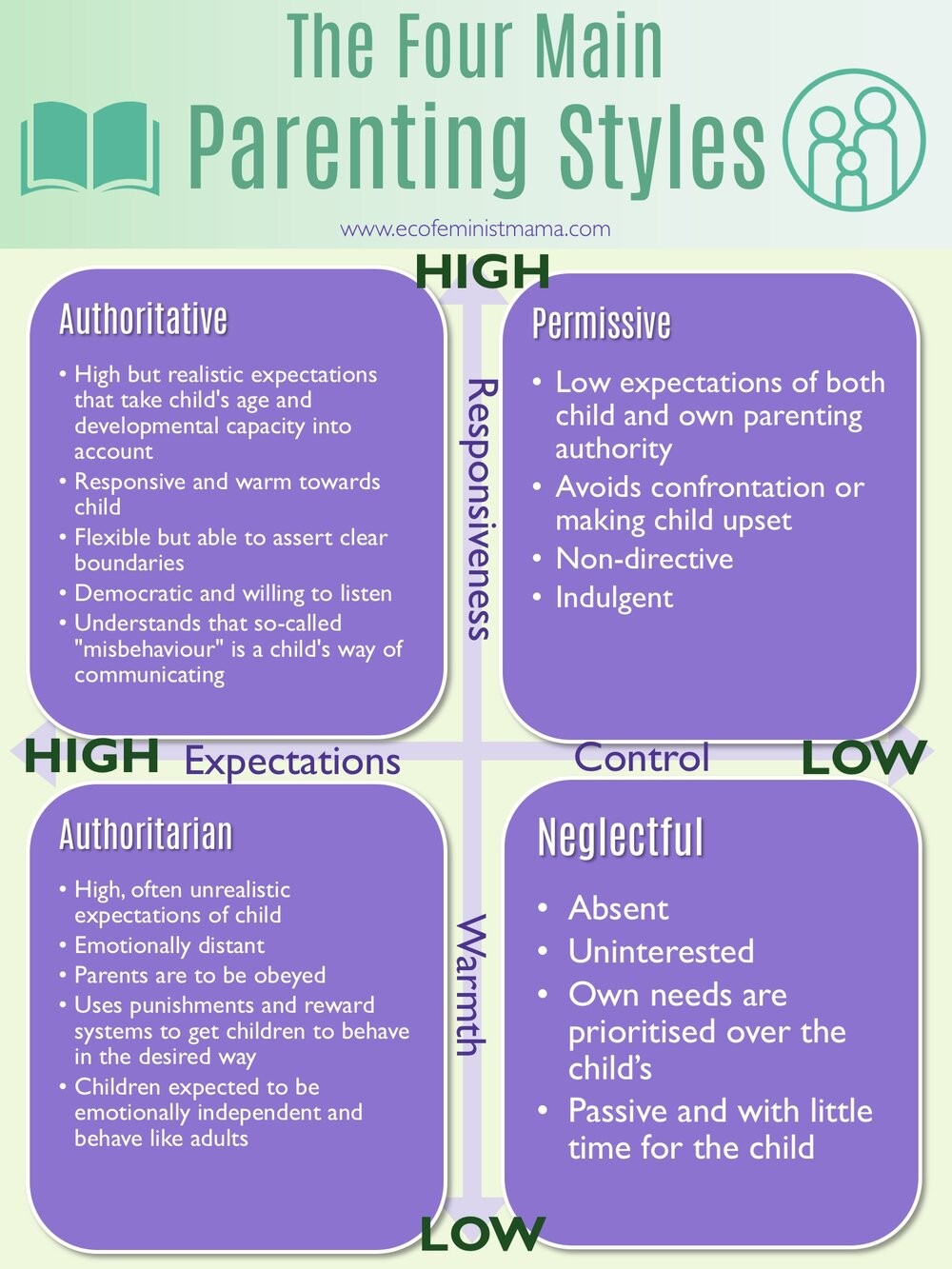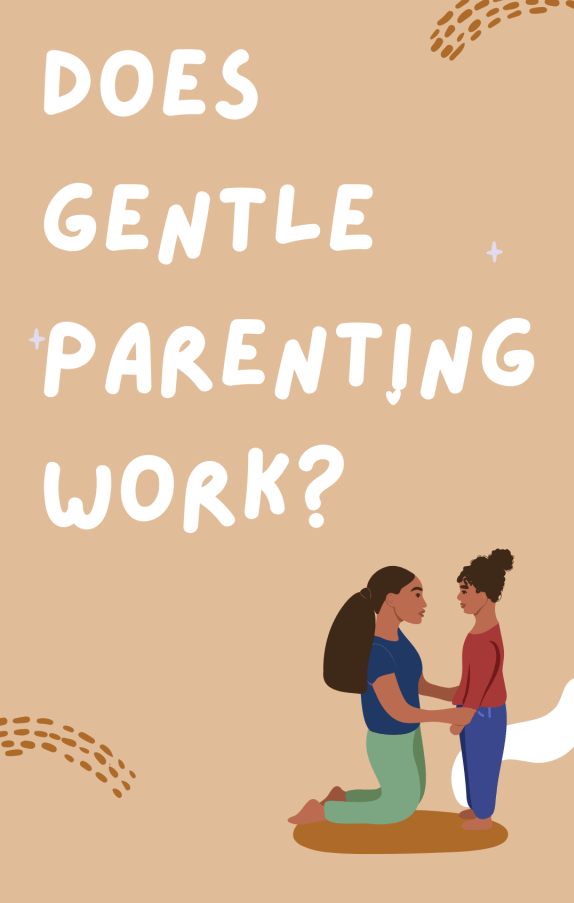Does gentle parenting work? Many parents wonder if this approach is effective.
The short answer is yes, but results can vary. Gentle parenting focuses on empathy, respect, and understanding. It aims to build a strong parent-child bond. Unlike traditional parenting, it avoids punishments and rewards. Instead, it encourages communication and cooperation. This method can lead to a more peaceful home environment.
However, it requires patience and consistency. Parents must be willing to invest time and effort. Gentle parenting may not yield immediate results. But over time, it can foster trust and mutual respect. In this blog, we will explore how gentle parenting works and its potential benefits for families.

Introduction To Gentle Parenting
Gentle parenting is a nurturing and empathetic approach to raising children. It emphasizes respect, understanding, and communication. This method contrasts with traditional, authoritarian styles of parenting.
Parents who practice gentle parenting aim to build a strong bond with their children. They focus on developing trust and mutual respect. The goal is to guide children with compassion and empathy.
Philosophy And Principles
Gentle parenting is based on a few core principles. These principles guide how parents interact with their children.
- Empathy: Understanding and sharing the feelings of your child.
- Respect: Treating children as individuals with their own thoughts and feelings.
- Understanding: Recognizing the reasons behind a child’s behavior.
- Boundaries: Setting clear and consistent limits with kindness.
These principles help create a nurturing environment. Children feel safe and valued. This fosters emotional growth and well-being.
Why It’s Gaining Popularity
Gentle parenting is becoming more popular for several reasons. Many parents are seeking alternatives to strict and punitive methods.
Research supports the benefits of gentle parenting. Studies show it leads to healthier emotional development. Children raised this way often have better social skills and self-esteem.
Parents also appreciate the positive impact on family dynamics. This approach encourages open communication and mutual respect. It helps build a strong, loving relationship between parent and child.
Social media has played a role in spreading awareness. Parents share their experiences and tips online. This has created a supportive community for those interested in gentle parenting.
| Traditional Parenting | Gentle Parenting |
|---|---|
| Authoritarian | Empathetic |
| Punitive | Respectful |
| Strict boundaries | Understanding limits |
Overall, gentle parenting offers a compassionate alternative. It aligns with modern values of empathy and respect.
Benefits Of Gentle Parenting
Gentle parenting is an approach that emphasizes empathy, respect, and understanding. It focuses on building a strong relationship between parents and children. This method has numerous benefits for both the child and the parent. Let’s delve into some key advantages.
Emotional Development
Gentle parenting supports emotional development in children. It helps them understand and express their feelings better. Here’s how:
- Children learn to manage their emotions.
- They develop empathy and compassion.
- They feel secure and understood.
Such an environment fosters a positive emotional state. Children grow up to be emotionally resilient adults.
Stronger Parent-child Bond
A stronger parent-child bond is a significant benefit. Gentle parenting focuses on mutual respect and understanding. This approach creates a nurturing environment.
Key aspects include:
- Open and honest communication.
- Consistent emotional support.
- Shared activities and quality time.
These practices strengthen the bond. The relationship is built on trust and respect. Children feel valued and loved.
| Benefit | Description |
|---|---|
| Emotional Development | Helps children manage and express emotions. |
| Stronger Parent-Child Bond | Builds trust and mutual respect. |
Impact On Child Behavior
Does gentle parenting work? Many parents ask this question. Gentle parenting focuses on empathy, respect, and understanding. But how does it affect child behavior? Let’s explore the impact.
Reduction In Tantrums
Gentle parenting can lead to a reduction in tantrums. Children feel heard and understood. When parents validate feelings, kids feel safe. This reduces the need for outbursts.
Here are some strategies:
- Listen actively to your child.
- Acknowledge their emotions.
- Offer comfort and support.
These steps help children manage emotions better. They know their feelings matter. So tantrums decrease over time.
Increased Cooperation
Another benefit is increased cooperation. Gentle parenting builds trust. Kids feel respected. They are more willing to listen and follow directions.
Consider these tips:
- Use positive language.
- Set clear expectations.
- Offer choices when possible.
Children respond well to positive reinforcement. Praise their efforts. This encourages them to cooperate more.
Gentle parenting fosters a loving and respectful relationship. This impacts behavior positively. Kids feel valued. They act out less and cooperate more.

Long-term Effects
Long-term effects of gentle parenting intrigue many parents. They wonder if this style benefits their children. The answer lies in observing children as they grow. Gentle parenting focuses on respect, empathy, and understanding. These values can shape a child’s future in remarkable ways.
Academic Success
Children raised with gentle parenting often do well in school. They feel secure and supported. This boosts their confidence and motivation. They are more likely to ask for help and participate in class. A strong parent-child relationship fosters a love for learning. These children usually perform better academically.
Emotional Intelligence
Gentle parenting nurtures emotional intelligence. Children learn to understand their feelings. They also become better at recognizing others’ emotions. This skill helps them build strong relationships. They can handle conflicts calmly. They grow into empathetic and compassionate adults. Emotional intelligence is key to personal and professional success.
Core Strategies
Gentle parenting is a nurturing approach. It focuses on respect, understanding, and empathy. This method relies on specific core strategies to guide children. Let’s explore two key strategies: positive reinforcement and setting boundaries.
Positive Reinforcement
Positive reinforcement encourages good behavior. It helps children feel valued. It builds self-esteem and confidence. Here are some key points:
- Praise specific actions
- Offer rewards like stickers or extra playtime
- Use kind words to express appreciation
For example, saying “Great job cleaning your room” is more effective than a general “Good job”. Children need to understand what they did right. This clarity helps them repeat good behaviors.
Setting Boundaries
Setting boundaries is vital. Children need to know limits. This creates a sense of security. Clear rules and consistent enforcement are key. Consider these steps:
- Explain rules in simple terms
- Be consistent with enforcement
- Use calm, firm language
Example: “We do not hit others. Hitting hurts people.” This is clear and direct. Children understand what is expected. They learn the consequences of their actions.
Boundaries help children feel safe. They know what behaviors are acceptable. This understanding leads to better self-control and respect for others.
Challenges And Solutions
Many parents are turning to gentle parenting due to its focus on empathy, respect, and understanding. Yet, like any parenting style, it comes with its own set of challenges. This section explores common issues faced by parents and offers practical solutions.
Consistency Issues
Maintaining consistency is crucial in gentle parenting. Children thrive on routine and clear expectations. Yet, staying consistent can be tough.
Solution: Create a daily schedule. Stick to it as much as possible. Use visual aids, like charts or pictures, to help your child understand routines. Involve your child in making the schedule. This gives them a sense of control and understanding.
Another way is to set clear boundaries. Explain the reasons behind rules. Use simple language. Reinforce positive behavior with praise. Stay calm during conflicts. Consistency builds trust and security.
Handling Public Criticism
Gentle parenting sometimes faces public criticism. Friends, family, or strangers may question your approach. This can be challenging.
Solution: Educate yourself about gentle parenting principles. This helps you feel confident in your choices. Share your knowledge with others. Sometimes, people criticize what they don’t understand.
Develop a support network. Connect with other gentle parents. Online forums, local groups, or parenting classes can be helpful.
Use polite but firm responses to criticism. For example: “This approach works best for our family.” or “We believe in fostering empathy and respect.” Focus on your child’s well-being. Remember, every family is unique.
Real-life Success Stories
Many parents wonder if gentle parenting truly works. Real-life success stories provide valuable insights. These stories highlight the effectiveness of gentle parenting. They come from diverse families and situations. Let’s explore some testimonials and expert opinions.
Testimonials From Parents
Jane, a mother of two, shared her experience. She struggled with her son’s tantrums. Gentle parenting techniques changed their dynamic. Jane now enjoys a peaceful home. Her son feels understood and valued. Jane believes in gentle parenting’s power.
Mark, a single father, also tried gentle parenting. His daughter used to be very defiant. After adopting gentle methods, their relationship improved. Mark noticed a positive change in her behavior. She now communicates openly and respects boundaries. Mark is grateful for these techniques.
Expert Opinions
Dr. Emma Smith, a child psychologist, supports gentle parenting. She says it fosters emotional intelligence. Children learn empathy and self-regulation. Dr. Smith’s research shows long-term benefits.
Another expert, Dr. John Doe, emphasizes consistent communication. He believes gentle parenting builds trust. Dr. Doe’s studies indicate lower stress levels in children. They also show improved academic performance.
Tips For New Parents
Gentle parenting focuses on respect, empathy, and understanding. It promotes a strong bond between parents and children. For new parents, this method can seem challenging. But with the right tips and support, it becomes easier. Let’s explore some useful tips for new parents.
Starting Early
Begin gentle parenting as soon as possible. Early interaction helps build trust. Talk to your baby, even if they cannot respond. It helps them feel secure. Respond to their needs quickly. This creates a safe environment. Consistency is key. Set a routine to make them feel stable.
Resources And Support
Use available resources to learn more about gentle parenting. Read books and articles. Watch videos from experts. Join parenting groups. Sharing experiences with others can be very helpful. Seek advice from experienced parents. They can offer valuable insights.
Don’t hesitate to ask for help. Parenting is a shared journey. Professional help is also available. Pediatricians and child psychologists can guide you. They can address any concerns you have.

Frequently Asked Questions
What Is Gentle Parenting?
Gentle parenting is a child-rearing approach focusing on empathy, respect, and understanding. It encourages positive discipline and communication.
Does Gentle Parenting Work?
Yes, gentle parenting can be effective. It promotes strong parent-child bonds and emotional intelligence.
What Are The Benefits Of Gentle Parenting?
Gentle parenting fosters trust, independence, and self-discipline in children. It helps in emotional and social development.
Is Gentle Parenting Suitable For All Children?
Yes, gentle parenting can be adapted for all children. It emphasizes individualized attention and respect for each child’s unique needs.
Conclusion
Gentle parenting offers many benefits. It fosters a strong parent-child bond. Children feel heard and valued. They learn to express emotions healthily. This approach encourages mutual respect. It may not suit every family. Each child and situation is unique. Assess your own needs and values.
Try gentle parenting methods. Observe how your child responds. Adjust strategies as needed. The goal is to raise happy, respectful kids. Gentle parenting could be the right choice for your family.

